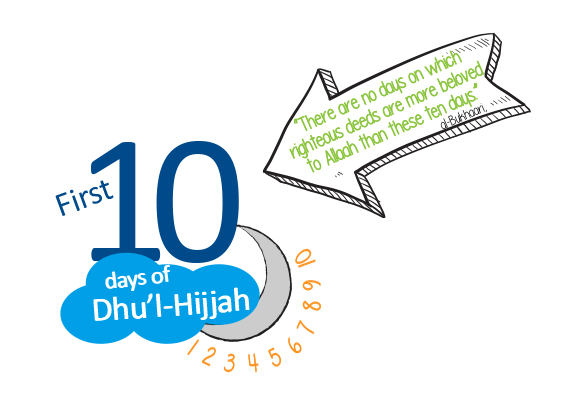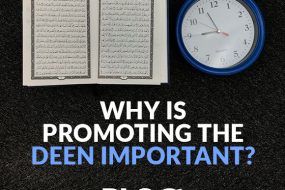
Among the great seasons of worship are the first ten days of Dhu’l-Hijjah, which Allah (![]() ) has favored over other days. It was narrated from Ibn ‘Abbaas (
) has favored over other days. It was narrated from Ibn ‘Abbaas (![]() ) that the Prophet (
) that the Prophet (![]() ) said: “There are no days on which righteous deeds are more beloved to Allah than these ten days.” They said: “Not even jihad for the sake of Allah?” He said: “Not even jihad for the sake of Allah, unless a man goes out himself for jihad taking his wealth with him and does not come back with anything.” 1
) said: “There are no days on which righteous deeds are more beloved to Allah than these ten days.” They said: “Not even jihad for the sake of Allah?” He said: “Not even jihad for the sake of Allah, unless a man goes out himself for jihad taking his wealth with him and does not come back with anything.” 1
It was also narrated from Anas (![]() ) that the Prophet (
) that the Prophet (![]() ) said: “There is no deed that is better before Allah or more greatly rewarded than a good deed done in the (first) ten days of al-Adha.” It was said: “Not even jihad for the sake of Allah?” He said: “Not even jihad for the sake of Allah, unless a man goes out himself for jihad taking his wealth with him and does not come back with anything.” 2
) said: “There is no deed that is better before Allah or more greatly rewarded than a good deed done in the (first) ten days of al-Adha.” It was said: “Not even jihad for the sake of Allah?” He said: “Not even jihad for the sake of Allah, unless a man goes out himself for jihad taking his wealth with him and does not come back with anything.” 2
These texts and others indicate that these ten days are better than all other days of the year, with no exception, even the last ten days of Ramadaan. But the last ten nights of Ramadaan are better than the first ten nights of Dhu’l-Hijjah, because they include Laylat al-Qadr, which is better than a thousand months.
So the Muslim should start these days with sincere repentance to Allah (![]() ), then he should do a lot of righteous deeds in general, then he should pay attention to doing the following deeds:
), then he should do a lot of righteous deeds in general, then he should pay attention to doing the following deeds:
1. Fasting
It is Sunnah for a Muslim to fast on the first nine days of Dhu’l-Hijjah, because the Prophet (![]() ) encouraged us to do righteous deeds in the first ten days of Dhu’l-Hijjah, and fasting is one of the best of deeds, which Allah has chosen for Himself. 3
) encouraged us to do righteous deeds in the first ten days of Dhu’l-Hijjah, and fasting is one of the best of deeds, which Allah has chosen for Himself. 3
It was narrated from Hunaydah ibn Khaalid from his wife, that one of the wives of the Prophet (![]() ) said: The Prophet (
) said: The Prophet (![]() ) used to fast on the first nine days of Dhu’l-Hijjah and the day of ‘Ashoora’, and three days each month, the first Monday of the month and two Thursdays. 4
) used to fast on the first nine days of Dhu’l-Hijjah and the day of ‘Ashoora’, and three days each month, the first Monday of the month and two Thursdays. 4
2 – Reciting tahmeed, tahleel and takbeer abundantly
It is Sunnah to recite takbeer (saying Allaahu akbar (Allah is most great)), tahmeed (saying al-hamdu Lillah (praise be to Allah)), tahleel (saying Laa ilaaha ill-Allaah (There is no god but Allah)) and tasbeeh (saying Subhaan-Allah (Glory be to Allah)), during the first ten days of Dhu’l-Hijjah, saying these words out loud in the mosques, homes, streets and every place in which it is permissible to remember Allah (![]() ), to perform this act of worship openly and proclaim the greatness of Allah (
), to perform this act of worship openly and proclaim the greatness of Allah (![]() ).
).
Men should recite out loud and women should recite quietly.
Allah says: “That they may witness benefits for themselves and mention the name of Allah on known days over what He has provided for them of [sacrificial] animals. So eat of them and feed the miserable and poor” [al-Hajj 22:28]
The majority are of the view that the “appointed days” are the first ten days of Dhu’l-Hijjah, because it was narrated from Ibn ‘Abbaas (![]() ) that the appointed days are the first ten days of Dhu’l-Hijjah.
) that the appointed days are the first ten days of Dhu’l-Hijjah.
It was narrated from ‘Abd-Allaah ibn ‘Umar (![]() ) that the Prophet (
) that the Prophet (![]() ) said: “There are no days that are greater before Allah or in which good deeds are more beloved to Him, than these ten days, so recite a great deal of tahleel, takbeer and tahmeed during them.” 5
) said: “There are no days that are greater before Allah or in which good deeds are more beloved to Him, than these ten days, so recite a great deal of tahleel, takbeer and tahmeed during them.” 5
The takbeer is as follows:
Allaahu akbar, Allaahu akbar, laa ilaaha ill-Allaah, Allaahu akbar, wa Lillaah il-hamd (Allah is Most Great, Allah is Most Great, there is no god but Allah; Allah is Most Great and to Allah be praise).
3 – Doing Hajj and ‘Umrah
One of the greatest deeds that can be done during these ten days is Hajj to the sacred House of Allah (![]() ). Whoever Allah (
). Whoever Allah (![]() ) helps to go on Hajj to His House and do the rituals in the required manner will – in sha Allah – be included in the words of the Messenger of Allah (
) helps to go on Hajj to His House and do the rituals in the required manner will – in sha Allah – be included in the words of the Messenger of Allah (![]() ): “An accepted Hajj brings no less a reward than Paradise.”
): “An accepted Hajj brings no less a reward than Paradise.”
4 – Udhiyah (sacrifice)
One of the righteous deeds that bring a person closer to Allah in these ten days is to slaughter the sacrifice and to look for a good, fat animal and to spend money on it for the sake of Allah (![]() ).
).
Let us hasten to make the most of these great days, before the negligent regrets what he did, and before he asks to go back and receives no response.
Source: http://islamqa.info/en/49042
- Narrated by al-Bukharee, 2/457 ↩
- Narrated by al-Daarimi, 1/357; its isnaad is hasan as stated in al-Irwa’, 3/398. ↩
- A hadeeth quds states: “Allaah says: ‘All the deeds of the son of Adam are for him, except fasting, which is for Me and I shall reward for it.” Narrated by al-Bukhaari, 1805. ↩
- Narrated by al-Nasaa’i, 4/205 and by Abu Dawood; classed as saheeh by al-Albaani in Saheeh Abi Dawood, 2/462. ↩
- Narrated by Ahmad, 7/224; its isnaad was classed as saheeh by Ahmad Shaakir. ↩








14 replies on “Virtues of the First Ten Days of Dhu’l-Hijjah”
may Allah bless you with his baraka
Alhamdulillahi, he make us among the shahidiiin of dhulqadah
JazakAllahu kharan. Amin
Nice article .May Allah help us all and forgive our sins.
Easy and Attractive Graphic Presentation …… May Allah Bless You With Immense Blessings
Great reminder.!..I love the content and beautiful illustration..May Allah bless you and your family with more articles to remind the ummah on drawing closer to Allah..JazakAllah.
Great article indeed. Very I formative
Mash Allah may ALLAH guide us all. Ameen
May ALLAH ( SWT ) continue to bless and guide you through out ur life endeavours we so much appreciate you and all our Islamic scholars may ALLAH ( SWT ) reward u all in ds world and the hereafter ameen ya RABB
[…] Among the great seasons of worship are the first ten days of Dhu’l-Hijjah, which Allah ( ) has favored over other days. It was narrated from Ibn ‘Abbaas ( ) that the Prophet ( ) said: “There are no days on which righteous deeds are more beloved to Allah than these ten days.” They said: “Not even jihad for the sake of Allah?” He said: “Not even jihad for the sake of Allah, unless a man goes out himself for jihad taking his wealth with him and does not come back with anything.” 1 […]
Alhamdhulillah…very beneficial sharing. JazakAllah khayr!
This is very useful as many our not aware of it. May I use your image on our Islamic school FB page ?
[…] ) said: “There are no days on which righteous deeds are more beloved to Allah than these ten days.” They said: “Not even jihad for the sake of Allah?” He said: “Not even jihad for the sake of Allah, unless a man goes out himself for jihad taking his wealth with him and does not come back with anything.” 1 […]
[…] Among the great seasons of worship are the first ten days of Dhu’l-Hijjah, which Allah () has favored over other days. It was narrated from Ibn ‘Abbaas () that the Prophet () said: “There are no days on which righteous deeds are more beloved to Allah than these ten days.” They said: “Not even jihad for the sake of Allah?” He said: “Not even jihad for the sake of Allah, unless a man goes out himself for jihad taking his wealth with him and does not come back with anything.” 1 […]